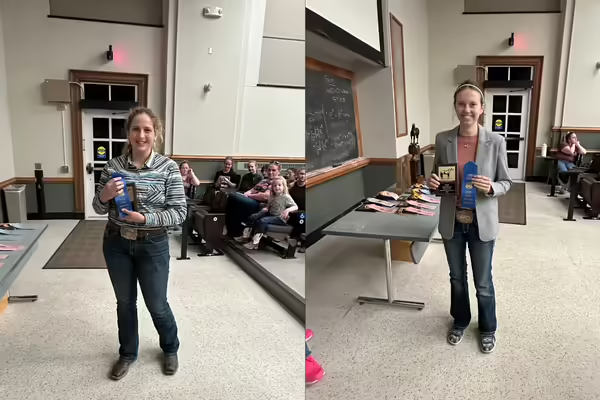
Urbana, Ill. -- In 4-H, learning about horses means much more than learning to ride. Young people with a passion for horses participated in recent statewide educational contests related to the equine industry. 4-H’s educational programs enhance members’ knowledge of horse health, breed characteristics, management, and feeding. That knowledge and skills were tested during the State 4-H Hippology Contest held April 11-12 on the University of Illinois campus.
In Hippology, youth field a wide range of questions, ranging from breed identification, anatomy, tack identification, and feed samples to disease management, parasite identification, and quality assessment. They also are given a timed problem-solving challenge they must solve on the spot in front of a panel of judges. Horse ownership is not a pre-requisite in the either the educational programs or contests.
Senior Division: Emily Conlee from Knox County, first; Avery Stegall from Knox County, second; Emma Steiger from Rock Island County, third; Annelise Veeder from Kendall County, fourth; Honoray White from Tazewell County, fifth; Shannon Bernard from Marion County, sixth; Abigail Schmidt from Carroll County, seventh; Alexis Modaff from Kendall County, eighth; Gabby Carden from Bureau County, ninth; and Jenna Green from Kendall County, tenth.
Intermediate Division: Devin Burrs from Carroll County, first; Moira Curry from Pike County, second; Gracie Walker from Hamilton County, third; Adalyn Bocker from Ogle County, fourth; Mallory Paur from Madison County, fifth; Lexi Merriman from DeWitt County, sixth; Lillian Elsea from DeWitt County, seventh; Addison Yordy from Ogle County, eighth; Nora Moore from Monroe County, ninth; and Julian Henry from Know County, tenth.
Junior Division: Audree Rehberg of Boone County, first; Jasmine Frerkes, Mercer County, second; Chloe Modaff, Kendall County, third; Paisley Martin, Mercer County, fourth; Cecelia Kampmueller, Champaign County, fifth; Ashton Borcherding, Marion County, sixth; McKenzie Merboth, Carroll County, seventh; Alice Conner, Champaign County, eighth; Jude White, Tazewell County, ninth; and Gracelyn Viall, Rock Island County, tenth.
Illinois youth who will compete in the National 4-H Hippology Contest are supported by the Illinois 4-H Foundation and its donors. This year’s event also Horse Bowl and Horse Speaking events.
About Illinois 4-H:
Illinois 4-H is the flagship youth development program of University of Illinois Extension, administered through the College of Agricultural, Consumer and Environmental Sciences. Through hands-on learning and life-changing experiences, Illinois 4-H prepares youth to be Beyond Ready — ready for college, career, military service, entrepreneurship, and more. Young people build confidence, leadership, and resilience as they explore interests from agriculture to computer science. Independent research and national surveys confirm the powerful outcomes of 4-H: participants are 40% more likely to pursue a college degree, twice as likely to obtain technical training, and two times more likely to serve in the military. With a legacy of cultivating leaders, Illinois 4-H continues to grow the next generation who are equipped to thrive in life and work today and beyond.
For Further Information, Contact:
Source: Deb Hagstrom, University of Illinois Extension Specialist, Horses hagstrom@illinois.edu
Writer: Carissa Nelson, Media Communications Manager, 4-H State Office, carissa@illinois.edu
University of Illinois Extension develops educational programs, extends knowledge, and builds partnerships to support people, communities, and their environments as part of the state's land-grant institution. Extension serves as the leading public outreach effort for University of Illinois Urbana-Champaign and the College of Agricultural, Consumer and Environmental Sciences in all 102 Illinois counties through a network of 27 multi-county units and over 700 staff statewide. Extension’s mission is responsive to eight strategic priorities — community, economy, environment, food and agriculture, health, partnerships, technology and discovery, and workforce excellence — that are served through six program areas — 4-H youth development, agriculture and agribusiness, community and economic development, family and consumer science, integrated health disparities, and natural resources, environment, and energy.